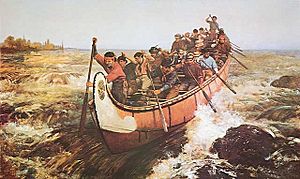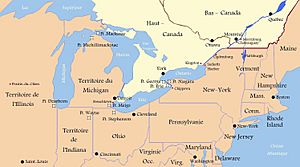Corps of Canadian Voyageurs facts for kids
Quick facts for kids Corps of Canadian VoyageursProvincial Commissariat Voyageurs |
|
|---|---|

Shooting the Rapids 1879
|
|
| Active | 1812-1815 |
| Country | British Canada |
| Allegiance | United Kingdom |
| Branch | British Army (1812-1813) British Commissariat Department (1813-1815) |
| Type | logistics |
| Role | transportation |
| Size | 400 |
| Motto(s) | Perseverance |
| Engagements | War of 1812 Skirmish at St. Regis 1812 Battle of Lacolle Mills |
| Commanders | |
| Notable commanders |
William McGillivray |

The Corps of Canadian Voyageurs was a special group created in September 1812. The British Army formed it to help move supplies by water. These skilled boatmen, known as voyageurs, were essential for keeping supply lines open. Their main job was to transport goods between Montreal and the distant western forts.
In March 1813, this corps was disbanded. Its important job was then taken over by a new group called the Provincial Commissariat Voyageurs. This new group was part of the British Commissariat Department, which handled supplies for the army. This second corps continued its work until March 1815, when it was also disbanded.
Contents
How the Voyageurs Were Organized
The idea for the Corps of Voyageurs came from the North West Company. This company was a big fur trading business. Its leaders, called bourgeois, became officers in the corps. The company's workers, known as engagés, became the regular soldiers.
The Provincial Commissariat Voyageurs had a clear structure. They had one lieutenant-colonel and one major. There was also one captain, ten lieutenants, and ten conductors. These conductors were like sergeants and acted as guides. The corps had about 400 private men.
The army wanted the voyageurs to wear uniforms. However, this was not practical for their work. Instead, they wore the regular clothes of civilian voyageurs. These clothes were much better for their tough jobs on the water.
Weapons Used by the Voyageurs
The British Army tried to give the voyageurs standard weapons. These included swords, pikes, and pistols. But these weapons were not useful for the voyageurs' tasks. Many men got rid of them or sold them.
Instead, the voyageurs preferred their own frontier weapons. They were given "brown bess" muskets, which were common rifles. They also used axes and knives. These tools were much more practical for their work in the wilderness.
Discipline and Their Important Role
The Corps of Voyageurs was known for being less strict than the regular British Army. The army had very tough rules and discipline. However, the voyageurs' unique skills were vital for the "wilderness war."
Even with their different approach to discipline, they did an absolutely essential job. They made sure supplies reached remote areas. Without them, the British Army would have struggled to fight in the distant western lands.
Leaders of the Corps of Canadian Voyageurs
Here are some of the key officers who led the Corps of Canadian Voyageurs:
- William McGillivray, who was the Lieutenant-colonel and commanding officer.
- Angus Shaw, who served as a Major.
- Archibald Norman McLeod, another Major in the corps.
- William McKay, who held the rank of Captain.
- Pierre de Rastel de Rocheblave, also a Captain.
Modern Re-enactment Group
Today, there is a group that brings the history of the Canadian Corps of Voyageurs to life! This modern historical re-enactment group started in 1975. It was organized by John Robertson at Old Fort William. This place is now known as Fort William Historical Park.
For over 40 years, this group has been strong. It has over 45 volunteer members. They work with Fort William Historic Park in Thunder Bay, Ontario. It's a family-friendly group that shows what military and voyageur militia life was like in the early 1800s. They also show family life from that time.
The Corps often provides Guards of Honour at local charity events. They add historical color and fire salutes for important visitors. They also teach new and old members how to safely use and care for firearms and equipment. Members are encouraged to join in group activities and camp life. This corps is not just about history; it's also a social group. They love learning about the past and teaching the public about Canadian history.

